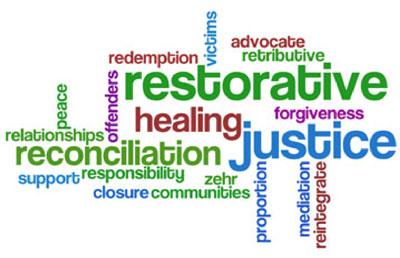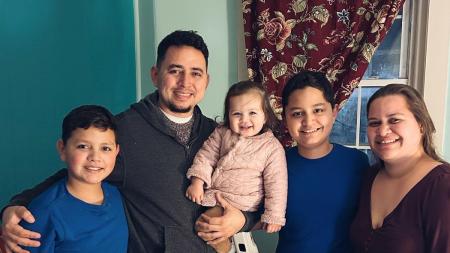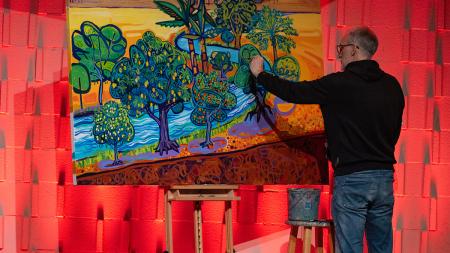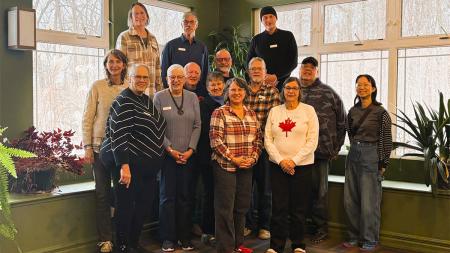Ex-offender Speaks Restorative Justice

Ross Hayes speaks to church groups about spending 35 years in prison for murder and how he eventually made peace with family members, especially a nephew, of the woman he killed by shoving a knife into her stomach during a botched robbery.
He was at Coit Community Church, a Christian Reformed Church in Grand Rapids, on a recent evening, spreading his message, talking to a group of young men about, among other things, a process that is known as "restorative justice" – a process of making peace between perpetrators and families that the CRC promotes through a range of educational materials and the work of a representative in the United States and another in Canada.
Restorative justice is a biblically based view of criminal justice that attempts to engage victims, offenders, and the affected communities in bringing about deep and lasting solutions by focusing on restitution, restoration, healing, and the future. At its core, it’s about relationships.
The CRC has been formally involved in the issue of restorative justice since 2005 when synod encouraged "the active participation of churches and church members in restorative justice efforts" – such as the one in which Hayes was describing on the recent evening. The CRC has developed many resources on the topic. Visit: Restorative Justice.
"It is not easy to get inmates to accept a sense of responsibility for what they have done and how they have violated a victim," says John Lamsma, restorative justice coordinator for the CRC in the US. Similarly, it’s not easy for a victim to offer forgiveness to the offenders, says Lamsma.
"I have seen first-hand the horrendous impact incarceration has on inmates and their families and the need for restorative justice," he says. "We also have to realize that victims of violent crimes have needs that are ongoing and long-term. The victim is almost neglected in the current process. They can speak before a sentence is handed down" and that tends to be about it.
Dressed in jeans, a leather jacket, and baseball cap, Hayes spoke on the recent evening to the young men about his experience as a criminal. He also spoke of how he came to experience a born-again turnaround while behind bars and began to take courses online, including theology classes, earning him degrees and helped him move in the direction of seeking restorative justice.
"I’m here to open life up to you," he said to the young men in the Coit CRC sanctuary. "You can do anything you want to do if you put God first. I want to talk to you about finding reconciliation."
To his surprise ad profound satisfaction, the nephew of the woman he killed sought him out and visited him in prison. The man had a religious experience himself that helped to turn his hatred for the man who killed his great aunt, whom he saw on the night of her death with the knife in her stomach, into a desire to seek him out and to talk.
Unbeknownst to either of them, they were on the road to restorative justice, a process that had taken many years for both of them to walk. When they met, Hayes says, "I asked him if he could forgive me, and he did."
Then the nephew asked Hayes if he could forgive for the hate he had harbored for many years against his great aunt’s killer. "I told him I did," says Hayes.
The two became friends and the nephew even testified at a parole hearing that helped lead to Hayes’ release. He had been given a life sentence. It was an example of how restorative justice can work, although it some cases it simply doesn’t take hold.
Since his release, Hayes has continued to reach out, using his story to inspire others to, he says, stay out of jail or at least to use jail time productively to honor God.
"I work with people getting out of prison and help them get things back together. Something inside of me has changed. I started to want to have more of God in me. Right now, God is my best friend. I’m able to do these speaking engagements because of God’s grace."
Hayes says he was in ninth grade and a good basketball player when he and his cousin broke into the house of an 89-year-old woman, looking for cash. When the woman returned home unexpectedly, Hayes through a series of circumstances stabbed her with the knife. He was arrested the next day.
Hayes says he works with groups and churches that help ex-offenders re-enter society, and he talks to them about the importance of restorative justice as a way of making amends and of trying to restore broken relationships. In so doing, he feels even closer to God and that much more compelled to share the message of forgiveness he found by following the gospel of Christ.
"You need to know that this (church) is a safe place," he said, gesturing around the sanctuary at Coit.
"It can help get you away from liquor and drugs and still have fun," he said. "You don’t know what will happen to you out there on the streets. You can step on somebody's new shoes and they’ll put two bullets in you. The only friend you really have is Jesus."
He encouraged the young men to live upright lives and not, as he did, "go through it the hard way. I no longer get mad just because someone else is mad."
The key to steering clear of trouble is to know who you are, he said. "I can't change anything about me if I don’t know who I am. I know for sure that anger, bitterness, and rage put you behind steel bars."
Lamsma says that restorative justice, especially bringing together those who have committed a serious crime with the victim and/or family members of the victim, usually takes many years, as was the case with Ross Hayes and the nephew.
"This usually is a long, drawn-out time frame and may mean that it will take churches working with victims years and years before any change is seen," he says.
"Another way of stating this is that for the church to be meaningfully involved in the lives of the victims they had better be prepared for a many-year process," says Lamsma.
"Forgiveness cannot be hurried or forced. The same is true for those who work with offenders."


